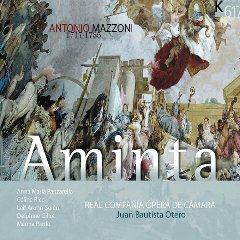Antonio Mazzoni – Aminta (Otero) [2007]
Antonio Mazzoni – Aminta (Otero) [2007]

DISC 1 1 Aminta: Senza Indicazione Di Tempo 00:02:10 2 Aminta: Andantino 00:01:52 3 Aminta: Allegro 00:00:45 4 Aminta: Intendo, Amico Rio 00:00:59 5 Aminta: Bella Elisa 00:01:29 6 Aminta: Alla Selva, Al Prato, Al Monte 00:05:58 7 Aminta: Perdono, Amici Dei 00:01:24 8 Aminta: So Che Pastor Son Io 00:06:43 9 Aminta: Or Che Dici 00:00:18 10 Aminta: Si Spande Al Sole 00:05:59 11 Aminta: Agenore, t'arresta 00:01:11 12 Aminta: Per Me Rispondete 00:06:21 13 Aminta: No, Voi Non Siete 00:00:28 14 Aminta: Di Tante Sue Procelle 00:05:56 15 Aminta: Ah Tornasti una Volta 00:00:15 16 Aminta: Dal Piu Fedel 00:01:25 17 Aminta: Elisa? Aminta? 00:00:31 18 Aminta: Vanne a Regnar 00:02:58 19 Aminta: Seguimi 00:00:19 20 Aminta: Al Moi Fedel 00:06:52 21 Aminta: Questa del Campo 00:00:17 22 Aminta: Barbaro, Oh Dio ! Mi Vedi 00:04:31 23 Aminta: Nel Gran Cor 00:01:07 24 Aminta: Ogni Altro Affetto Ormai 00:07:42 25 Aminta: Agenore, Signor 00:00:45 26 Aminta: Ah Per Voi la Piant Umile 00:07:45 DISC 2 1 Aminta: O Per la Mia Tamiri 00:01:59 2 Aminta: So Vincendo, Vi Rendo Felici 00:05:25 3 Aminta: Oh In Aspeta Pettato 00:00:25 4 Aminta: Misero Me, Ti Perdo Bella Tamiri 00:01:53 5 Aminta: Eccomi a Te Di Nuovo 00:00:32 6 Aminta: Dove Agenore 00:01:05 7 Aminta: Ah Tu Non Sei Piu Moi 00:02:13 8 Aminta: Ahi Mè, Declina Il Sol 00:02:29 9 Aminta: Oh Me Infelice 00:00:25 10 Aminta: L'amero, Saro Costante 00:08:46 11 Aminta: Uscite Al Fine 00:00:36 12 Aminta: Ma Senti Agenore 00:00:42 13 Aminta: Io Rimaner Divisa 00:05:41 14 Aminta: Povera ninfa 00:01:13 15 Aminta: Se Tu Di Me Fai Dono 00:05:56 16 Aminta: Misero cor 00:00:29 17 Aminta: Sol Puo Dir Come Si Trova 00:05:24 18 Aminta: Marcia 00:02:07 19 Aminta: Voi Che Fausti Ogn'or Donate 00:05:54 20 Aminta: Ola, Que Piu Si Tarda 00:00:44 21 Aminta: Ah Giustizia, Signor 00:01:09 22 Aminta: Signor, Io Sono Aminta 00:02:15 23 Aminta: Dalla Selva, e Dall'ovile 00:00:34 Anna Maria Panzarella (Soprano) Celine Ricci (Soprano) Delphine Gillot (Soprano) Marina Pardo (Mezzo soprano) Leif Aruhn-Solén (Tenor) Real Companía Ópera de Cámara Orchestra Juan Bautista Otero - conductor
Here is yet another operatic masterpiece reborn thanks to Juan Bautista Otero and his splendid Réal Compania Opera de Camara. 'Aminta, il re pastore' is an extraordinary work which the famed castrato Farinelli commissioned from the Bolognese composer Mazzoni after the huge success of his two operas produced in Lisbon, 'La clemenza di Tito' and 'Antigono'. Faithfully following Metastasio's original libretto, Mazzoni composed here a sublime opera seria in 3 acts, shorter than usual, with a blend of pathos, delicacy of expression and virtuosity that gives a marvelously complete picture of what one might call 'the Farinelli sound'. --- arkivmusic.com
Antonio Mazzoni was admired in his day for his “fire and fancy” but quickly fell into oblivion after his death in 1785. His career in his native Bologna was broken by a brief spell in Lisbon; and though the evidence is not watertight, Aminta was probably commissioned by Farinelli, as impresario to King Ferdinand VI, when Mazzoni fled the Portuguese capital after the 1755 earthquake. Contrary to the implication in the cover blurb, though, Farinelli had virtually retired from singing by 1756, and did not perform any of the roles in the opera.
Juan Bautista Otero sums up Aminta as “a sublime opera seria” and goes on to praise the “surprisingly avant-garde elements of refined musical dramaturgy”. To my ears, though, Mazzoni’s opera – using the Metastasio libretto that Mozart later drew on in his Il rè pastore – is thoroughly conventional in its structure and musical language. Typically, the central theme is the tug between love and duty, resolved by a model ruler (Alexander the Great) who is almost too good to be true. The shepherd-king Aminta and Elisa, and the secondary lovers, Agenore and Tamiri, face painful dilemmas; but all the characters act from honourable motives and utter noble Enlightenment sentiments.
Mazzoni responds to this slender, slow-moving drama with a sequence of florid da capo arias, many of them virtually interchangeable. There is virtuosity galore, though I hear little of the pathos and delicacy identified by Otero. Still, the curious will find the performance lively and accomplished, with rhythmically springy playing from the period orchestra and a generally stylish cast. --- Richard Wigmore, gramophone.co.uk
download (mp3 @256 kbs):








